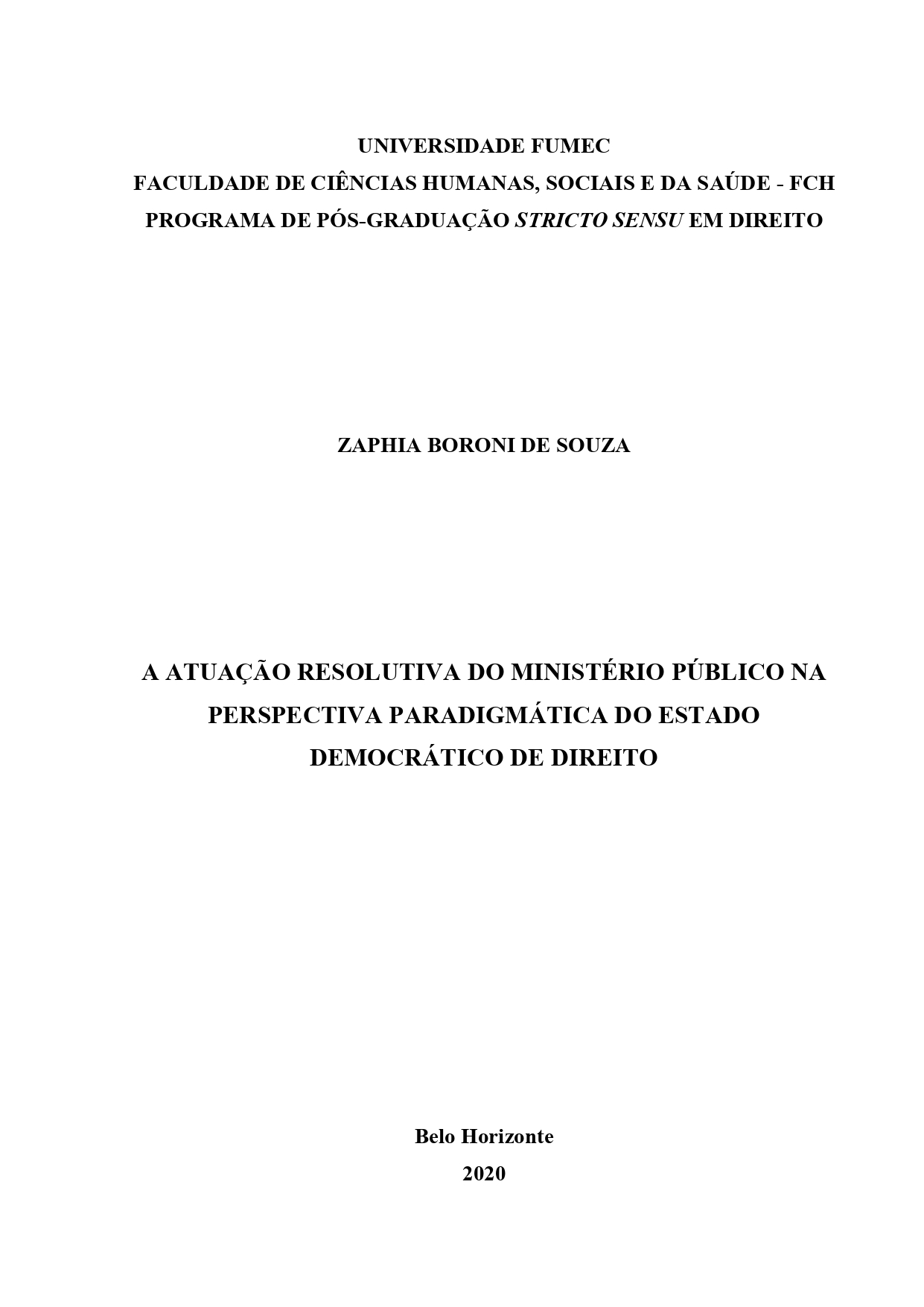A atuação resolutiva do ministério público na perspectiva paradigmática do estado democrático de direito

Visualizar/
Data
2020Autor
Souza, Zaphia Boroni de
xmlui.mirage2.itemSummaryView.MetaData
Mostrar registro completoResumo
A Constituição da República Federativa do Brasil de 1988, que instituiu o projeto do Estado
Democrático de Direito, alçou o Ministério Público à categoria de Instituição independente,
permanente, com atribuição para a defesa da ordem jurídica, do regime democrático e dos
interesses sociais e individuais indisponíveis, cabendo, portanto, atuação proeminente na
fiscalidade da implementação do projeto democrático. Nesse viés, propõe-se, pela dogmática
jurídica, o denominado perfil resolutivo do Ministério Público, que tem por premissa a atuação
proativa, reflexiva, voltada à fiscalidade preventiva e atuante no âmbito extrajurisdicional. A
pesquisa desenvolvida neste trabalho tem por objetivo estudar as vias de atuação resolutiva do
Ministério Público, notadamente o inquérito civil, o compromisso de ajustamento de conduta,
as recomendações e as audiências públicas, questionando-os frente ao paradigma jurídicoconstitucional do Estado Democrático de Direito, perquirindo se estão em consonância com a
democraticidade jurídica ou se ainda restaria ao Ministério Público um viés histórico de atuação
autoritária. Analisou-se, portanto, as bases teóricas que dizem respeito à processualidade
democrática, cujos fundamentos se encontram nas teorias constitucionais do processo,
apresentando as compreensões paradigmáticas do Estado de Direito, com abordagem dos
desdobramentos paradigmáticos do Estado Liberal e Estado Social, tratando, por fim, do
paradigma atual do Estado Democrático. Abordou-se, ainda, os preceitos introdutórios dos
fundamentos da processualidade democrática, buscando, por fim, correlacionar a atuação
preventiva do Ministério Público como sendo a forma mais legítima de atuação ministerial no
Estado Democrático de Direito. A pesquisa é de cunho bibliográfico e se utiliza da metodologia
de base hipotético-dedutiva de Karl Popper. The 1988 Constitution of the Federative Republic of Brazil, which instituted the project of the
Democratic State of Law, raised the Public Ministry to the category of an independent,
permanent institution, with responsibility for the defense of the legal order, the democratic
regime and social and individual interests unavailable, therefore, it is important to have a
prominent role in the taxation of the implementation of the democratic project. In this bias, it is
proposed, by legal dogmatics, the so-called resolutive profile of the Public Ministry, which has
as premise the proactive, reflective action, focused on preventive taxation and acting in the
extrajurisdictional scope. The research developed in this work aims to study the ways of
resolving action by the Public Ministry, notably the civil inquiry, the commitment to adjust
conduct, recommendations and public hearings, questioning them in the face of the legalconstitutional paradigm of the Democratic State of São Paulo. Law, investigating whether they
are in line with legal democracy or whether the Public Prosecutor's Office would still have a
historical bias of authoritarian activity. Therefore, the theoretical bases that relate to democratic
procedurality were analyzed, whose foundations are found in the constitutional theories of the
process, presenting the paradigmatic understandings of the Rule of Law, with an approach to
the paradigmatic developments of the Liberal State and Social State, treating, for end, of the
current paradigm of the Democratic State. It also addressed the introductory precepts of the
foundations of democratic procedurality, seeking, finally, to correlate the preventive action of
the Public Ministry as being the most legitimate form of ministerial action in the Democratic
State of Law. The research is bibliographic and uses Karl Popper's hypothetical-deductive
methodology.
